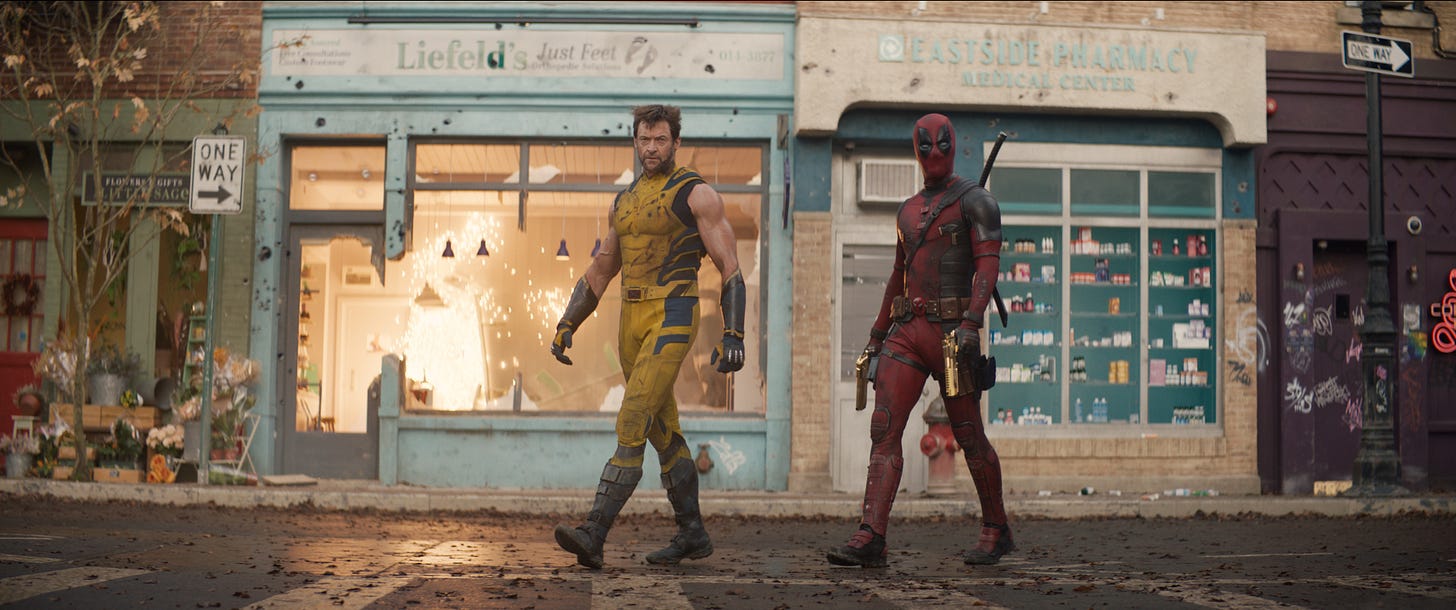'Deadpool & Wolverine' is less a movie than a corporate merger
I won’t say there’s not occasional fun, and if you liked the first two, you will like this too. But in this movie, nothing much matters at all.
In late 2017, Disney announced that it was acquiring the movie studio assets of the company long known as Twentieth Century Fox. This was a significant moment in Hollywood's history, including the combination of two companies that had been part of the industry for nearly a century and the elimination of an entire movie studio, one that cost many people their jobs.
However, during the 15 months between the announcement of that transaction and its closing in the spring of 2019, most of the headlines were about one specific question: What does this all mean for Wolverine? And will the MCU and X-Men sides of the Marvel world finally share the screen in a movie?
Five years after the merger's closing, we finally have the first big crossover: Deadpool and Wolverine, the only MCU movie set for release this year. It’s the third Deadpool movie after the first two were released by Fox pre-merger, and in it, he brings along Wolverine, the character Hugh Jackman has been playing since the first X-Men movie almost 25 years ago.
The result is what’s bound to be called a “love letter” to the X-Men and other Fox-era superhero movies, simultaneously pitched with constant wisecracking, riffing, and vulgarity.
It’s also a movie that’s extraordinarily smug and pleased with itself, directed by Shawn Levy, who last directed Ryan Reynolds’ previous intellectual property-dependent superhero smarmfest, Free Guy.
I won’t say there aren’t some fun moments, and Reynolds and Jackman are sometimes fun together. But overall, this is barely a movie but a delivery system for in-jokes, fan service, and cameos. Every last plot machination — from the five different credited writers — is put together with only those things in mind.
I’ll try to spoil things lightly: As the movie begins, Wade Wilson (Reynolds) is retired as a superhero and spends most of his time with a group of friends from the previous film. Soon, he runs afoul of the Time Variance Authority, everybody’s favorite bureaucracy from the ancillary Disney+ Marvel shows. A rogue TVA authority (Succession’s Matthew Macfadyen, as “Mr. Paradox”) threatens to eliminate timelines.
This leads him to seek out Wolverine, although because the character is long dead, this requires some interdimensional machinations. In the closest thing the film has to a good idea, the Wolverine we see here is a version of the character who failed in the past and must redeem himself.
This leads the characters into an interdimensional void called “The Void,” where they face a bald female villain named Cassandra Nova (Emma Corrin). Both Macfadyen and Corrin are performers I know better from prestige TV (Succession and The Crown, respectively), and I’m used to them acting out much better writers than what’s on offer here.
The Void is not to be confused with the Quantum Realm from last year’s terrible Ant-Man sequel (it’s designed, at least, with some skill and spatial continuity.) The Void's purpose is to allow filmmakers to bring back characters regardless of whether they’re alive, dead, or in existence in previous iterations of intellectual property. None of that matters as long as audiences get to do a shocked cheer at that person’s entrance.
Deadpool & Wolverine has numerous significant weaknesses, and it tries to get around most of them by having characters verbalize those weaknesses in dialogue, sometimes more than once, and usually while smirking at the camera.
Isn’t Wolverine dead, and beyond that, didn’t he already have a perfect sendoff with satisfying closure in 2017’s Logan? Yes. Is the concept of multiverse-based storytelling exhausted, especially in the superhero genre? Oh yea. Has the Deadpool character himself gotten seriously tiresome? You betcha.
But the movie thinks it can get away with this by calling itself out repeatedly.
This is in addition to constant inside jokes about Disney, Fox, paychecks, and references to things that have been recent headlines in the Hollywood trades and fanboy rumor sites. And cameos. There are so many cameos, to the point where the film becomes too dependent on the shock of “Hey, it’s that guy!” If anything, it resembles a sugar high.
And that’s ultimately the biggest problem with this entire exercise: Nothing matters. And I’m not only talking about the scene where a villain, for no apparent reason, executes a deus ex machina to help out the heroes.
The plot is seriously convoluted, so it’s hard to spot exactly what the stakes are for the characters. After all, as has been the case for the last several years, it’s hard to take storytelling seriously when we know there are endless other universes, not to mention variants of the characters. At its best, multiverse storytelling allows stuff like all three Spider-man actors to share the screen. But most of the time, it’s just an excuse for cinematic nihilism.
There’s a really ugly dog I wasn’t as nearly charmed by as I guess I was meant to be.
I expect this movie to make a ton of money and probably lead to more sequels, with Hugh Jackman continuing to get dragged out there when he’s past 60. But don’t worry- I’m sure that film will have lots and lots of self-referential jokes about Hugh Jackman getting dragged out there when he’s past 60.
I know what a great superhero movie looks like, and this isn’t it.





You don't know anything about the void if you think it's purpose is to allow filmmakers to bring back characters. You think that you know everything about the void. But the truth is you know no s**t. If you think this is just a fan service, then what's the purpose of superhero movies ?
"I know what a great superhero movie looks like, and this isn’t it."
Spiderman 2